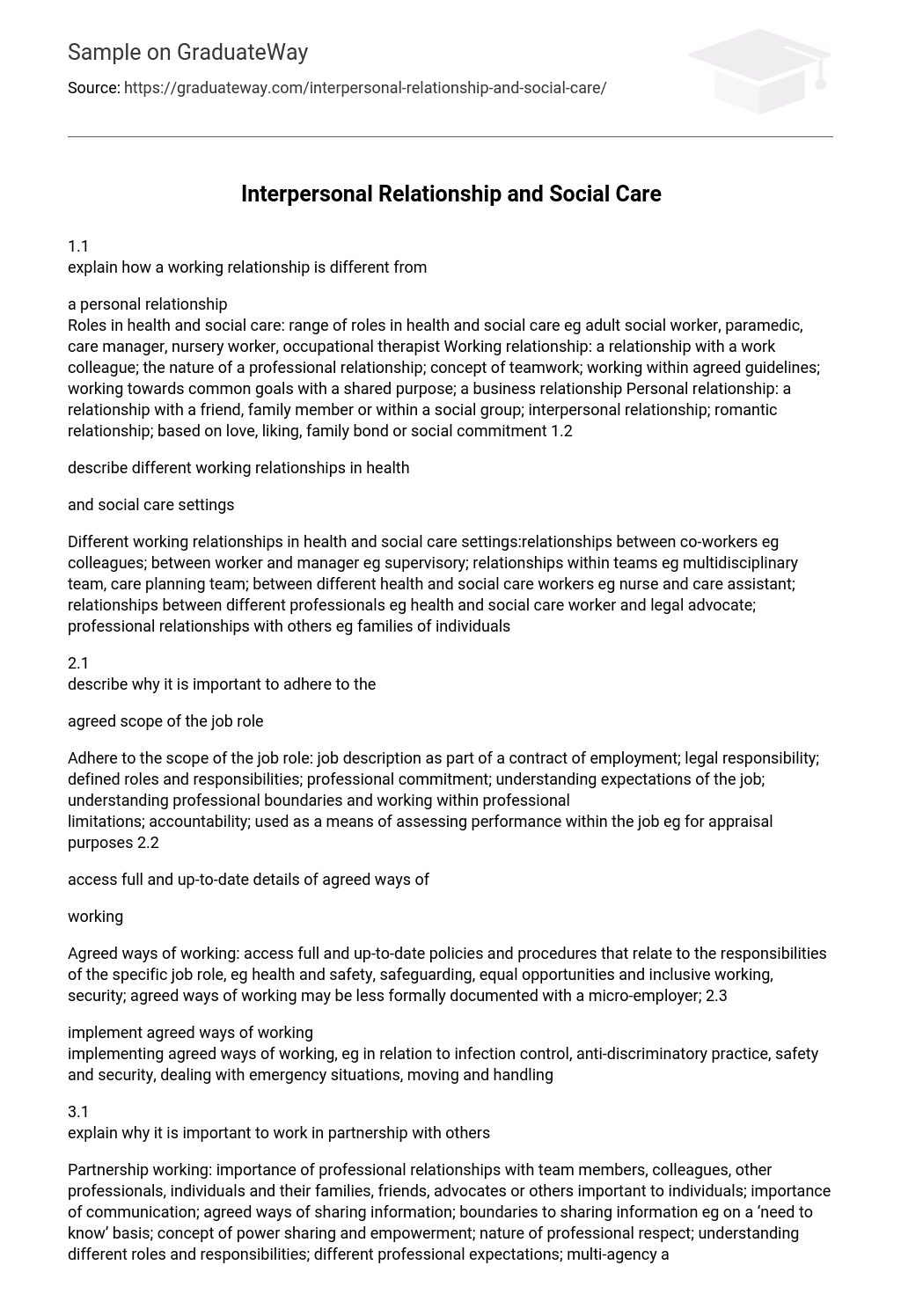1.1
explain how a working relationship is different from
a personal relationship
Roles in health and social care: range of roles in health and social care eg adult social worker, paramedic, care manager, nursery worker, occupational therapist Working relationship: a relationship with a work colleague; the nature of a professional relationship; concept of teamwork; working within agreed guidelines; working towards common goals with a shared purpose; a business relationship Personal relationship: a relationship with a friend, family member or within a social group; interpersonal relationship; romantic relationship; based on love, liking, family bond or social commitment 1.2
describe different working relationships in health
and social care settings
Different working relationships in health and social care settings:relationships between co-workers eg colleagues; between worker and manager eg supervisory; relationships within teams eg multidisciplinary team, care planning team; between different health and social care workers eg nurse and care assistant; relationships between different professionals eg health and social care worker and legal advocate; professional relationships with others eg families of individuals
2.1
describe why it is important to adhere to the
agreed scope of the job role
Adhere to the scope of the job role: job description as part of a contract of employment; legal responsibility; defined roles and responsibilities; professional commitment; understanding expectations of the job; understanding professional boundaries and working within professional
limitations; accountability; used as a means of assessing performance within the job eg for appraisal purposes 2.2
access full and up-to-date details of agreed ways of
working
Agreed ways of working: access full and up-to-date policies and procedures that relate to the responsibilities of the specific job role, eg health and safety, safeguarding, equal opportunities and inclusive working, security; agreed ways of working may be less formally documented with a micro-employer; 2.3
implement agreed ways of working
implementing agreed ways of working, eg in relation to infection control, anti-discriminatory practice, safety and security, dealing with emergency situations, moving and handling
3.1
explain why it is important to work in partnership with others
Partnership working: importance of professional relationships with team members, colleagues, other professionals, individuals and their families, friends, advocates or others important to individuals; importance of communication; agreed ways of sharing information; boundaries to sharing information eg on a ‘need to know’ basis; concept of power sharing and empowerment; nature of professional respect; understanding different roles and responsibilities; different professional expectations; multi-agency and integrated working; 3.2
demonstrate ways of working that can help improve
partnership working
improving partnership working through effective communication and information sharing; collaboration and team-working; multi-agency team meetings and conferences; main principles of ‘No Secrets’ (2000) formulti-agency working in health and social care 3.3
identify skills and approaches needed for resolving
conflicts
Resolving conflicts: skills and approaches needed for resolving conflicts, eg managing stress, remaining calm, being aware of both verbal andnon-verbal communication, controlling emotions and behaviour, avoiding threatening others, paying attention to the feelings being expressed as well as the spoken words of others, being aware of and respectful of differences, developing a readiness to forgive and forget, having the ability to seek compromise, seeking resolution, being specific with communication, trying not to exaggerate or over-generalise, avoiding accusations, importance of active listening 3.4
demonstrate how and when to access support and
advice about:
–
partnership working
–
resolving conflicts
Access support and advice: knowing how and when to access support and advice about partnership working, eg in relation to sharing information, issues about confidentiality, confusion about roles and responsibilities, professional limitations or expectations, understanding professional boundaries; understanding agreed ways of working for seeking out support; knowing how to access support, eg through manager or supervisor,
professional organisation, independent advisory organisations; knowing how and when to access support and advice about resolving conflicts, eg in relation to professional disagreements, issues with individuals or their families, conflict with colleagues or managers; knowing how to access support, eg through mentoring support, employment counselling, independent advisory organisations, trade unions





